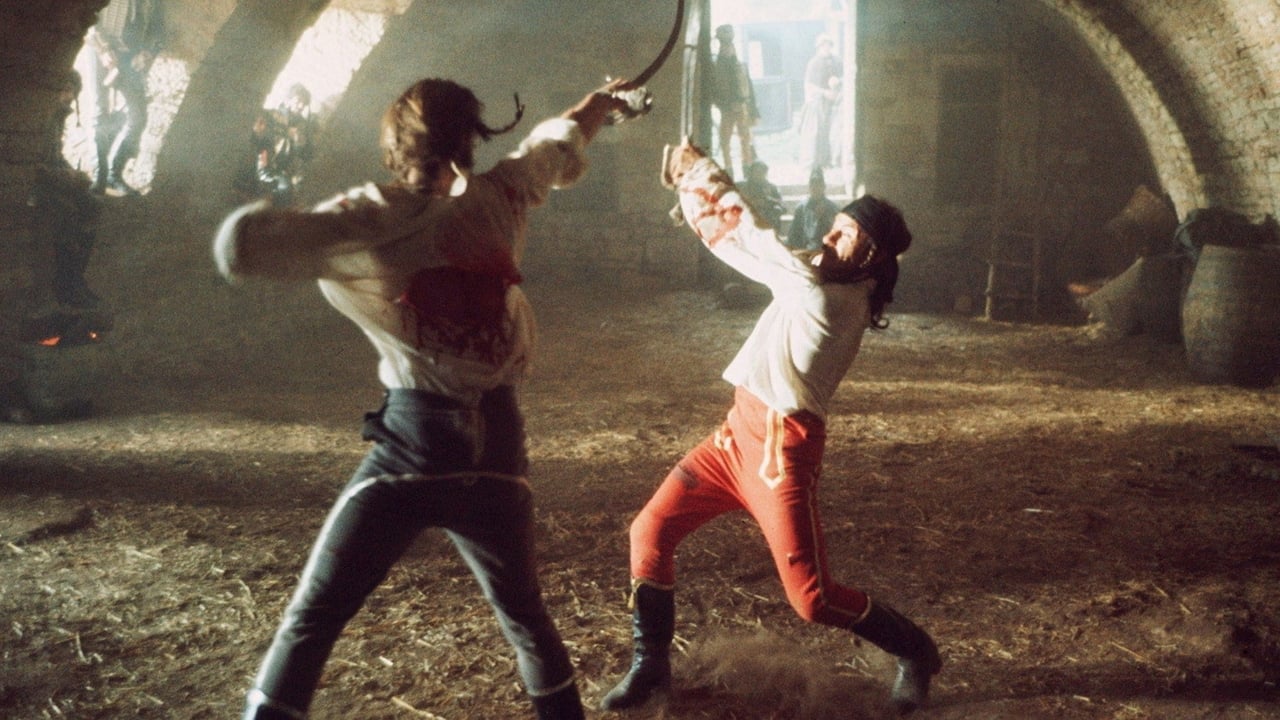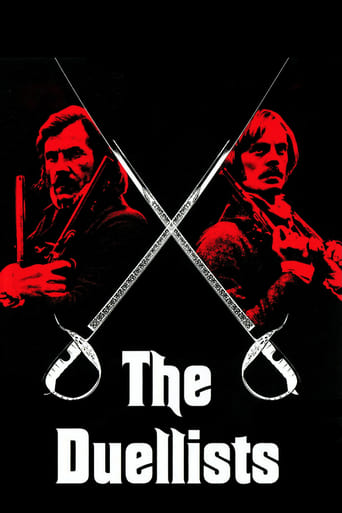

The bg issue with this film is the cast and acting. It's not the scenery which is a lush tour of 19th Century Europe where honor and integrity win the day among the Hussars in Napoleon's Grand Armee. It's not the costumes which are so authentic as to be antiques. Brightly colored uniforms, hats bursting with plumage, and gowns fit for a queen. It's not the staging which sets the scenes perfectly in the glow if candlelight or in the bitter cold steppes of Russia during the battle for Moscow. It isn't the script which had just the right combination of old world lingo and new humor to make it work. It's not really the concept either which is based on true events. There was a pair of Hussars who dueled over 20 years. They did each distinguish themselves in the army and earn promotions to generals. No it's none of those things. It's the cast and the acting. I understand that Ridley Scott was given a choice of four actors to choose from for the two leads. His first two choices fell through so here we are with Carradine and Keitel. First Carradine. His acting is non-existent and he's not at all believable as either a military man or a man driven by honor above all else. He comes off as a beach bum from California, not a Napoleonic Frenchman. The way in which he spoke some of the lines seemed contrived mainly because in those days people used a lot more words to get their points across. Instead of saying, "I won't go to the party," they instead would say, "I daresay I shan't be attending the fete." Or something like that. Carradine just said the words without attaching any real meaning to them. He was as bland as can be. Also, the actress who played his sister inexplicably spoke with an English accent. It was very strange to hear her "brother" answering her in a valley boy voice (oh my gawwwd). As for Keitel, I'm not sure anyone would even need to see the movie to realize that casting him as a French Hussar from the 1800s is making a major error. He just can't pull off historical work. Not only is he incapable of dropping his Brooklynese accent, he doesn't even seem to want to try. All he does is speak his lines slowly and precisely in the same tough NY way he always does. It's unbelievable that Ridley Scott thought it was appropriate to have the entire cast speak in English accents except for the two main characters. They stuck out like sore thumbs and not in a good way! Neither of them had the acting chops to play this type of role which called for straight backed military men who are driven by their ideas about what a gentleman must do, how their integrity plays into that, and how risking one's life to maintain honor is paramount. Keitel walked around like the tough gangster type he always does and seemed not to care about what anyone said or did. He's given direct orders which he ignores but somehow makes it all the way to general? Although true in real life, he certainly didn't play it that way. He didn't seem to care about anything but fighting duels and watching out for Carradine so he could challenge him again. As for Carradine, he seemed to be going through the motions of doing his duty but he really didn't act as though he cared about anything either. He seemed mildly annoyed whenever he ran into Keitel and that didn't change much until the middle section of the film and only slightly. All in all, a beautifully photographed movie that isn't worth your time because the acting and casting is so egregiously wrong that it's impossible to look past it to enjoy the movie. PASS
... View MoreWatching this picture in early 80' l was impressed by such reliable tale of two soldiers and their duels through the time,without notice over Ridley Scott which a have to know on Blade Runner,in that period of time l was so young and didn't able to record many names,just the leading roles or so,Scott use a Napoleon's era as a perfect backdrop to development this remarkable story,today having a third look l realized how was deeply the Ridley's debut and telling of own words this first experience in making movies....simply outstanding!!!Resume: First watch: 1983 / How many: 2 / Source: TV-DVD / Rating: 9.25
... View MoreIt's sparkles as two words meeting in the air. It's Ridley Scott's debut film (inspired by a Joseph Conrad's tale) and it is based on a futile motive of offense turned into a 15-years-long-lasting-duel: From the time Napoleon got on charge (1800) till the beginning of the Restoration (1816). That's a challenge protracted through the time and involving two hussar lieutenants: Volatile and insolent Gabriel Féraud (Harvey Keitel) and measured courteous Armand d'Hubert (Keith Carradine).The opposition between two natures, two points of view, two worlds can bump into each other only on the edge, in the heat of a duel Scott show us using quick reverse shots. There is a perfect melody linked to those cutting blows we saw in their memorable clash in Strasbourg, in the Féraud's house courtyard where the same Féraud got injured.But this is only the starting point of a rivalry sliding through years and places, becoming an obsession to Féraud and a fierce anxiety to his opposite D'Hubert. There are only these two figures in front of us while all other things roll on the background and everything else fade in the vague conglomerated of the facts – Thanks to backlits that Ridley Scott skilfully builds on around the single fact that matters: The duel Féraud/D'Hubert.Two uniforms will wind up the following year in Augusta: Once in a farmstead's garden when D'Hubert were wounded to the chest and he couldn't continue the match; then inside a barn with a grisy fight goes on to the exhaustion of the contendings – Spectators stop them.By the time they are compromised men and an iron bond inextricably grip them. Whilst moderate D'Hubert tries to escape the forthcoming vis à vis, he stumbles upon his enemy in a tavern in Lubecca (1806). So here it is a new quarrel. On horseback. But this time D'Hubert becomes Féraud: The wicked challenger ends up on the ground for the impetus of whom wants to definitely close the game.However the duel will never get to the end until one will die. And six years later that phantom comes again in the middle of the blank desertic Russia Campaign, but this time Féraud and D'Hubert's guns aim at the same direction to stifle Cossacks threat. History steps in between. And it also does when they return home: Armand D'Hubert is at the service of King Louis XVIII; instead Gabriel Féraud wrecks himself like his Emperor does.D'Hubert becomes general; Féraud gets in the list of whom destined to the guillotine. But general D'Hubert has a personal code honor and asks for a grace to be given to his rival Féraud, interceding to the powerful Police Minister, Joseph Fouché (Albert Finney).Nevertheless the duel hasn't disappeared and there is nothing can placate Féraud. Until the epilogue in Tours (1816), the final skirmish amongst ruins of a castle: One gun and two cartridges to everyone.Féraud consumes his, D'Hubert has one lock and load and takes a decision: He honorably decides to declare dead the enemy and so to take his life. He decides to lead him to his hour death and to stop men who challenge the world as everything is a dull game.
... View More(83%) Could this be the finest shot, most beautiful films ever to be made by a first time feature film maker? Well it's certainly a contender. Scott really went to town making this look and feel like a period novel has come alive on the screen using both fine tiny detail and wide open and very dramatic vistas. The plot deals with both the importance and the absurdity of honour in the early 19th century as the two army officers have an off and on again personal battles rather likened to a romantic comedy. There's enough substance to accompany the stunning visuals, but the film is a touch one note, although the ending is brilliantly powerful and satisfying in a very unique way.
... View More